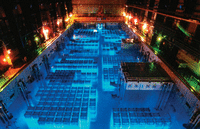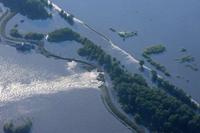-
Middle school robotics team develops solution to food poisoning

A group of eight middle school students in California has developed an electrolyzed water vending machine that can cheaply and effectively reduce food contamination
-
-
Fukushima accident caused only low levels of fallout in U.S.
Fallout from the 2011 Fukushima Dai-ichi nuclear power facility in Japan was measured in minimal amounts in precipitation in the United States in about 20 percent of 167 sites
-
-
2010 Russian heat wave caused by both manmade, natural causes
The heat wave that struck western Russia in summer 2010 killed 55,000 people and caused $15 billion in damage; a new study concludes that soaring temperatures were within the natural range for a Russian summer, but that due to human-induced climate change, the chance of such an extreme heat wave has tripled over the past several decades
-
-
Recycled glass in cement makes concrete stronger
Researchers have found that by mixing ground waste glass into the cement that is used to make concrete, the concrete is stronger, more durable, and more resistant to water; in addition, the use of glass helps reduce the amount of glass that ends up in landfills
-
-
Proposed EPA budget cuts funding from clean air and water grants
President Obama’s latest proposed budget for fiscal year 2013 cuts $105 million from the Environmental Protection Agency’s (EPA) budget, primarily from funds aimed at treating wastewater and drinking water
-
-
Faculty retention a major challenge for universities
New study shows men and women faculty retained at same rate; but median retention rate for all university professors is only eleven years; if a university hires 100 assistant professors tomorrow, in eleven years only fifty of them will still be at the school
-
-
Nuclear waste recycling for better nuclear power generation

Researchers aim to produce safe nuclear fuel that can be 80 percent recycled, compared to the current 1 percent; these fourth generation nuclear power systems can lead to a reduction of the amount of high-level, long-lived nuclear waste to a tenth of what it is today, while energy output can increase hundredfold
-
-
Invisibility cloak to protect buildings from earthquakes
Scientists show that by cloaking components of structures with pressurized rubber, powerful waves such as those produced by an earthquake would not “see” the building — they would simply pass around the structure and thus prevent serious damage or destruction
-
-
Advances in the use of photocatalysts to help keep water clean safe
Photocatalysis involves the acceleration of chemical reactions using the power of light; researchers experiment with different types of photocatalysts to reduce nitrates in water
-
-
Four-legged robot carries troops’ load
The increasing weight of military equipment has a negative impact on soldiers’ readiness and effectiveness; reducing the load on dismounted soldiers has thus become a major point of emphasis for defense research and development; the Legged Squad Support System (LS3) robot follows squad members through rugged terrain and interact with them in a natural way, similar to the way a trained animal and its handler interact, while carrying 400 lbs. of squad’s gear
-
-
Local officials oppose “unacceptable” levee ratings

In recent years as part of an effort to bolster the nation’s flood protection infrastructure, the Army Corps of Engineers has analyzed and declared more than 200 levee systems across the country as “unacceptable,” resulting in a firestorm of criticism from local officials
-
-
New technology will allow miniaturization of chemical sensors
A new measuring technology – based on measuring near-resonant nonlinear behaviors rather than measuring chemomechanically induced shifts in linear natural frequency – will allow a dramatic miniaturization of sensors; the miniaturization will make these sensors more suitable for first response, law enforcement, and military missions
-
-
Influx of ex-Soviet mathematicians changed mathematics in U.S.
One of the little-noticed effects of the collapse of the Soviet Union in 1992 was the way in which math is studied and taught in the United States; Soviet mathematicians who came to the United States reduced the role of American mathematicians in certain specialties, and in some specialties the likelihood of a competing American mathematician producing a top research paper has declined
-
-
New methodology evaluates risk of scarce metals
China produces more than 95 of the world’s rare Earth metals, making governments and businesses around the world uneasy; researchers develop a methodology ti answer two important questions: how do we know what is scarce? If we know a metal is scarce, how do we know whether we should worry about it?
-
-
Wireless underground robots for first responders
First responders may have to look for victims in hostile or challenging environments, such as clandestine tunnels, subway systems, and underground structures; sending a wireless robot to look around and pull victims out would be safer
-
More headlines
The long view
New Technology is Keeping the Skies Safe
DHS S&T Baggage, Cargo, and People Screening (BCP) Program develops state-of-the-art screening solutions to help secure airspace, communities, and borders
Factories First: Winning the Drone War Before It Starts
Wars are won by factories before they are won on the battlefield,Martin C. Feldmann writes, noting that the United States lacks the manufacturing depth for the coming drone age. Rectifying this situation “will take far more than procurement tweaks,” Feldmann writes. “It demands a national-level, wartime-scale industrial mobilization.”
How Artificial General Intelligence Could Affect the Rise and Fall of Nations
Visions for potential AGI futures: A new report from RAND aims to stimulate thinking among policymakers about possible impacts of the development of artificial general intelligence (AGI) on geopolitics and the world order.
Smaller Nuclear Reactors Spark Renewed Interest in a Once-Shunned Energy Source
In the past two years, half the states have taken action to promote nuclear power, from creating nuclear task forces to integrating nuclear into long-term energy plans.
Keeping the Lights on with Nuclear Waste: Radiochemistry Transforms Nuclear Waste into Strategic Materials
How UNLV radiochemistry is pioneering the future of energy in the Southwest by salvaging strategic materials from nuclear dumps –and making it safe.
Model Predicts Long-Term Effects of Nuclear Waste on Underground Disposal Systems
The simulations matched results from an underground lab experiment in Switzerland, suggesting modeling could be used to validate the safety of nuclear disposal sites.
